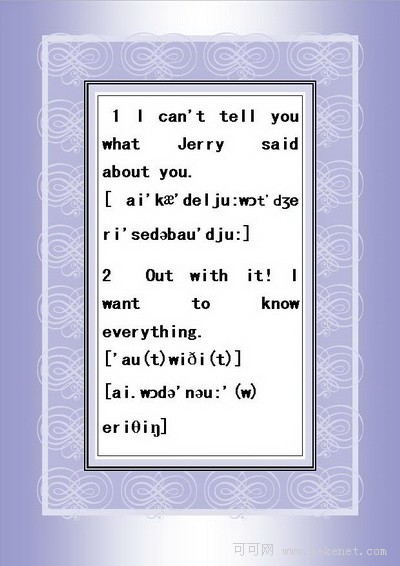(单词翻译:单击)
Morning,guys!I am Juliet. Nice to meet you through network. Hope we could spend a wonderful morning together. An hour in the morning is worth two hours in the evening.
一天之计在于晨,若您有个美好的晨间生活,相信您一天的生活都是美好的,您会由此而滋生快乐之感。A hard beginning makes a good ending. 常言道:善始善终。
【温故知新】
Last time we learned ' Out with it. ' This is a way to say "I want to hear the truth from you." It's usually said by a teacher or a parent when they think a child is lying. 现在我们马上来揭晓上期的翻译习题答案。
1 桑迪,打开窗子说亮话。干脆--朋友间就不要保守秘密。
Sandy, out with it. Come-no secrets among friends.
2你在苦思冥想些什么?说出来吧!
What are you thinking of so intensively?Out with it!
3 如果你有什么想法, 我希望你说出来。
If you have anything on your mind, I want you to come out with it.
【点评】have something on one's mind 意思是:某人心中想着些东西,某人心中有心事。 Come out with it. 坦白地说出来。
【实际发音】
I can't tell you what Jerry said about you.
It’s pronounced as [ ai'kæ'delju:wɔt'dʒeri'sedəbau'dju:] in American films.
1 can't tell you
①Can在肯定句中是弱读,a的发音为[ə],但是在否定句中是重读,a的发音为[æ]。
②Can't tell 中的can't 是以[t]结尾,tell则是以[t]开头,雷同的两个音标,can't中的[t]就不发音了。
③ Tell you 中的tell是以辅音[l]结尾,you的发音为半元音[ju:], 连读为[lju:]. 因此can't tell you 发音为['kæ'delju:]。
2 said about you
① said about 中的said是以辅音[d]结尾,about是以元音[ə]开头,连读为[də].
② about you中的about是以清辅音[t]结尾,you的发音为半元音[ju:], 且清辅音在元音前浊化为浊辅音[d], 连读为[əbau'dju:]。
Out with it! I want to know everything.
['au(t)wiði(t)] [ai.wɔdə'nəu:'(w)eriθiŋ]
① Out with it中的out是以爆破音结尾,在美语中发音很弱很弱,甚至语速快时就吞掉这个音。
② want to中的want是以爆破音[t]结尾,to是以同一个爆破音开头,雷同的两个音标,out中的[t]就不发音了。To 在美语中发音为[də]。
③ know everything中的know是以双元音[əu]结尾,everything是以元音[e]开头,元音和元音也是要连读的,这个规律很难掌握。[əu]遇到[e]时,连读时在两个音标之间加上辅音[w]。因此,发音为['nəu:'(w)eriθiŋ]。
附实际发音图:
【小题大作——咬文嚼字】
I can't tell you what Jerry said about you.
Say about something or somebody 意思是:论某人或某事。She said nothing to me about it. 她没有跟我说过这件事。He knew if he wasn't be back by midnight, his father would have something to say. In this sentence, have something to say means“to be angry’.他知道如果他半夜还未归家的话,他的父亲会发火的。
Talking of "say", we have some useful short sentences. They are as follows:
1 I said to myself, ' That can't be right. '我心想,那不对。“Say to oneself” means "think".
2 —— That's impossible. —— So you say.
—— 那不可能。—— 不见得。"So you say." means "I think you might be wrong."
3 It's said that she lived to be over 100 years. 据说她活了100多岁了。It's said that + a clause 意思为据说。It's similar to saying "Rumour has it that..." or "Report has it that... "
4 —— Why can't I go out now? —— Because I say so.
—— 我为何现在不能出去? —— 因为我说了算。
5 —— What do you want it for? —— I would rather not say.
—— 你要这做什么? —— 我还是不说的好。
As for sentence structure analysis, can't tell is predictive. "What Jerry said about you" is an objective clause used as direct object. "You" is indirect object.
【对话翻译】
A : Mom, I can't tell you what Jerry said about you.
B : Out with it. I want to know everything.
A : 妈妈,我不能告诉你Jerry是如何说你的。
B : 别隐瞒了,说出来吧。我想知道。
Alright, that's enough for today. It is Friday today. May you have a nice day. Thank you for your listening this time. See you next time.
小编温馨提示:更多精彩尽在可可地盘。



